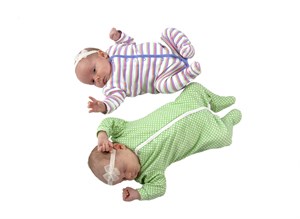By Professor Graham Hall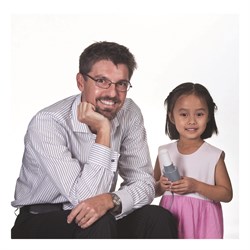
The lungs are one of the last organs in the body to develop as a baby grows. They're also one of the most important. How well they grow and develop can have everlasting impact on a person's life so making sure young lungs get the best start is a key focus for researchers at The Kids Research Institute Australia.
Lungs double in size in the first two years of life and then keep slowly growing after that.
By the time we reach adulthood our lungs range between 3 and 5 litres in capacity. Any disruption to this growth process through illness, disease or poor breathing environments can be damaging.
Asthma and other lung related illness and disease such as Cystic Fibrosis affect millions of Australians, especially kids. In fact Australia has one of the highest incidences of asthma in the world, with 14-16% of children and 10-12% of adults diagnosed as asthmatic.
On a world scale the impact is even greater. Chronic lung diseases are estimated to affect over 300 million individuals globally and according to the World Health Organisation figures in 2008, over 4 million people died as a result of chronic lung disease.
Understanding the early pathways that lead to these illnesses is our best chance of preventing their development and providing better treatment.
For nearly 25 years, The Kids has been at the forefront of childhood respiratory research. Our work is varied and wide-ranging, from leading development of an asthma vaccine in a world-first international trial, to collecting important data from thousands of WA children so we can better investigate causes and incidence of early respiratory infections, the development of allergic diseases and the impact of wheeze.
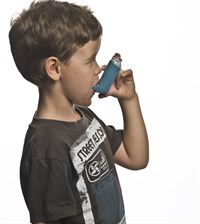 It is well known that asthma is the most common chronic illness in children which results in wheezing and is often associated with cough and/or shortness of breath with exercise.
It is well known that asthma is the most common chronic illness in children which results in wheezing and is often associated with cough and/or shortness of breath with exercise.
At The Kids we are working closely with respiratory experts from Princess Margaret Hospital to develop child-friendly lung function tests so we can improve diagnosis of exercise-induced asthma at a younger age.
We're also leading the way in Cystic Fibrosis (CF) research, a devastating condition that leads to premature lung damage and severely impacts not only the quality of the child's life but also their loved ones, with ongoing demanding treatments and medication required.
Kids with cystic fibrosis suffer from thick sticky mucus that clogs their lungs which can make it very difficult for them to breathe. The mucus also traps bacteria in the lungs causing infections that can lead to further damage, respiratory failure and a life expectancy of only 35 years.
Our research has helped determine that infants and young children with CF show evidence of early inflammation and infection leading to reduced lung function. Our focus now is to develop better treatments to prevent these early warning signs from progressing further.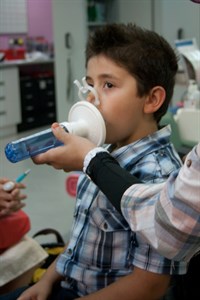
As part of a unique research collaboration called AREST CF (Australian Respiratory Early Surveillance Team for Cystic Fibrosis) we've helped develop an internationally recognised early surveillance program for detecting lung disease in CF kids that includes complex measurements of lung function in the very young.
Studying lung development in premmie babies is also a focus of ours and we'll be talking more about this in a free seminar to be held at The Kids on Tuesday May 27.
Bronchopulmonary dysplasia remains the most significant chronic lung complication of premature birth but treatment of preterm babies has changed so dramatically over the past few decades that we need to know more about the long term impact of lung development in kids born earlier than expected.
As a result we've been conducting a lung function study of kids who were born prematurely but are now between 9 and 11 years of age to determine the long-term impact of having underdeveloped lungs at birth.
The vital information we will collect from this important study will have far reaching impact on not only how we treat premmie babies at birth but also the way we can nurture their lung growth over time.
We're also conducting important research into the impact of air travel on premature bubs, and the potential impact of low oxygen levels in aircraft on babies.
The environment we live in can also have major impact on the development of lungs in both children with lung problems and those without, and this leads us to another part of our respiratory research - environmental factors.
Our research team has also been looking at the impact of air pollutants during pregnancy on developing lungs, building on other studies that also looked at the long term impact on young lungs of mums smoking during pregnancy.
If we are able to understand how these things affect lung growth, then we're better placed to influence health policy and help create healthier environments for our kids.
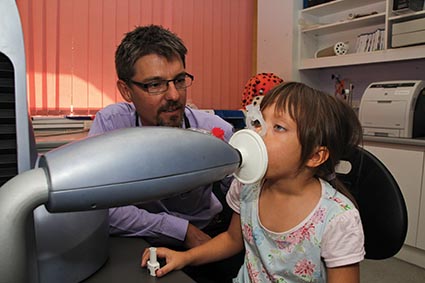 The respiratory research list is never-ending and continues to be a key focus of The Kids. But to do this research we need your help in not only understanding how unhealthy lungs develop but also how healthy lungs continue to grow.
The respiratory research list is never-ending and continues to be a key focus of The Kids. But to do this research we need your help in not only understanding how unhealthy lungs develop but also how healthy lungs continue to grow.
As a result our research studies are on the lookout for a range of kids in all age groups including those with lung problems and those without. You can find out more about our wide range of asthma and respiratory research here or by contacting Georgia Banton at The Kids on 9489 7818 or georgia.banton@telethonkids.org.au

